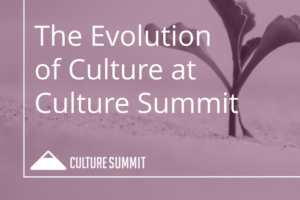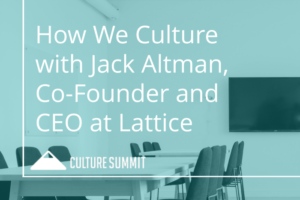Are you gearing up for the Culture Summit? Let us help you get in the mood by introducing you to one of this year’s workshop facilitators, Michelle Lee and Jenny Gottstein of IDEO’s Play Lab.

Name: Michelle Lee
Position: Portfolio Director, Design For Play @ IDEO

Name: Jenny Gottstein
Position: Design Lead, Design For Play @ IDEO
What initially attracted you to the Culture space?
Michelle: Early in my career, I switched from the aerospace industry to toys because I needed to understand how my work could create positive emotional impact. Seeing a child deeply engaged with a favorite toy energized me in a way that couldn’t be matched by the launch of a satellite that, while amazing in its own way, was virtually invisible to the end cell phone user. My days in the toy industry taught me that through human-centered design, I could inspire joy, creativity and optimism.
Jenny: Before working at IDEO, I worked at The Go Game for 7 years (first as a game producer, and later as director of the game design department) as we designed team-building games for companies around the world. It was an eye-opening experience – I saw firsthand how much culture contributed to the overall success of the company. After a while, it became easy to spot the teams that were driving that success.
Here was the key indicator: they played well together! They cheered each other on, they complimented each other’s strengths and worked collaboratively to find creative solutions to curve-ball challenges. All of these teams, no matter what industry, had the same magic ingredients: Trust, laughter, curiosity, risk-taking and creativity. Based on those observations, I knew I wanted to design playful opportunities to help teams tap into those magical ingredients.
How has that attraction evolved throughout your career?
Michelle: I’ve had the fortune of being a designer at a time when the role of design has greatly expanded. Previously seen as a way to make products more aesthetically pleasing, design has now evolved into design thinking – a method that is being widely applied to meaty challenges that extend to systems and organizations. We now create impact not only through products, but also through organizational tools and processes. This includes teaching teams to use design thinking themselves. One of the most rewarding aspects of my job is seeing team members light up when they realize that they can be creative and have fun while tackling some of their company’s biggest challenges.
Jenny: As a game designer, I know how to design for a healthy competitive spirit that will produce outstanding results. But I’ve also seen that, when unchecked and rooted in individualism, competition can be disastrously toxic. At IDEO, one of our core values is “Make Others Successful”, which is why the company’s culture is so vibrant. Watching my colleagues embody this value every day has been a huge inspiration, and has reinforced my passion for designing experiences that help people bring out the best in each other.

If you couldn’t work in the Culture space, what would you be doing?
Michelle: I’d probably be co-writing a children’s book with my kids. I love the idea of a role where there’s limitless potential and room for creativity. This should be true of most job opportunities, but children’s books are boundless, letting you imagine the craziest characters and adventures. Add in some pretty rad co-workers, and it makes for one amazing work environment!
Jenny: Wind-tunnel dancing.
How do you define culture? Do you think there is or should be a universal definition?
Michelle: Culture can be difficult to define because it’s so much greater than the sum of its parts. It’s how a group behaves, what it believes, what’s acceptable and what’s not, but more so it’s a feeling you get when you’re surrounded by a certain group of people that drives how you act in those surroundings.
In game design, we talk about the concept of emergence. In emergence, individual pieces come together and interact to generate something new that could only have emerged through those interactions. If you think about this in terms of culture, culture isn’t static. It continues to evolve as different players interpret and act upon elements of the culture that have previously been established. The role of HR gets really interesting here, as HR can help shape culture by hiring, recruiting and elevating individuals who may reinforce an existing culture or push it in a new direction.
There’s definitely room for different interpretations of culture. Just as I think of culture from the perspective of game design, others will have their own ways to approach culture.
Jenny: Culture is like a party. When it works, EVERYONE wants to show up. When it feels forced, everyone makes lame excuses to leave early. Like a party, culture should be thoughtfully designed, and yet no one should feel like they are forced to attend. It’s important that everyone can co-create the party experience!

What are some common misconceptions about culture?
Michelle: Many people look to management to establish culture when it can actually be influenced by anyone in the company. It also doesn’t need to be established through company-wide policies, values or traditions. Individuals contribute to culture through how they interact with others on a daily basis.
Another misconception is that play contributes to culture only by providing breaks from productive work. In fact, integrating a playful culture into key aspects of work can make for greater creativity, innovation and satisfaction.
Jenny: Culture is not an “add-on” feature, nor a switch you can turn on or off with happy hours and perks. It’s a practice that has to be exercised every day in every corner of the company’s operations.
What’s the best culture advice you’ve ever received?
Michelle: When David Kelley first started IDEO, he talked about never wanting to employ more people than could fit on a single school bus. While the company now has more than 700 employees, it still feels like a small company. This is largely because David set the stage with his early vision. Within IDEO, different locations, disciplines and portfolios are empowered to create their own subcultures within the larger company culture, enabling them to have their own flavors while still holding human-centered design and IDEO’s company values at their core. Each group is like its own school bus in a fleet of buses all headed in the same direction.
In the Play Lab, where the Design for Play team resides, puns are commonly mixed into everyday conversation, fun surprises will be left on desks, meetings will conclude with purposely awkward high fives and prototypes are often seen flying through the air. On top of this, you’ll find a team that loves to collaborate, isn’t afraid to throw out crazy ideas, is quick to prototype and truly believes that all ideas belong to the group. Having smaller subcultures such as these creates a sense of pride and connection that feels authentic and right. It also enhances an employee’s sense of stake and purpose, in the smaller group identity as well as the company as a whole.
Jenny: The managing director at one of our IDEO locations is a huge proponent of hiring “unicorns” – people who don’t necessarily fit in a prescribed role, but have a unique perspective and combination or quirky skills. Each time he hires a unicorn, he tells them “The only way you will fail here is if you conform. We hired you because you DON’T fit. The whole point is for us to grow in new directions – you can help us change our DNA.” I think that’s brilliant because it flies in the face of hiring ‘good culture fits’ which can lead to homogeneity.

If you had to pick one culture-enhancing practice or “tactic” most companies could or should implement, what would it be?
Michelle: One practice that often gets missed in the race to constantly innovate is taking the time to reflect, celebrate and look beyond your walls. This can take the form of an annual review to look back and see how much has been accomplished over the course of a year, but it can also be accomplished through smaller gatherings that happen quarterly, monthly or weekly.
Every Tuesday, our location gathers over lunch. The meal is cooked fresh by James, a beloved member of our Experience Team, giving the event a very personal flavor. Katie, another member of the team serves as MC, providing her own energetic and quirky flair that have become critical to our culture. The next hour is filled with individuals sharing lessons from recent projects; inspiration from personal trips, local events or global news; celebrations of birthdays and anniversaries; and occasionally a heartfelt, if slightly goofy, award for someone who has gone above and beyond. In a world of emails and Slack messages, there’s still something very magical about physically coming together in one space.
Jenny: Listen for laughter! Studies have shown that laughter increases creativity. Wherever laughter is, innovation is not far behind.
If you could impart one universal understanding about company culture to every senior executive in the world, what would it be?
Michelle: Cultures can be designed, just like products and services can be designed. At the heart of it, it’s about creating positive human experiences.
When we design, our first step is to build empathy – taking the time to listen and observe. Next, we identify opportunities. What elements of culture are already bubbling up from different sources? What’s resonating with your employees while aligning with your company mission? What can you continue to nurture and grow? Also, where is your company facing challenges and how could culture help address these challenges?
From here, don’t be afraid to prototype. Rather than make one big statement about culture, try small experiments to see what works and surface leaders who are excited to build your experiments into larger agents of culture change. Finally, iterate to create a stronger culture over time that can evolve with your company’s changing needs.
Jenny: You can’t mandate culture, and it won’t change over night. You have to till the soil, tend to it with TLC, and have patience until culture blooms organically.
It’s the year 2030, what is the workplace culture dialogue talking about?
Michelle: Technology advances are putting an abundance of data and information at our fingerprints. Over time, it will be interesting to see how those tasked with shaping workplace culture embrace these new tools. As we can track more and know more, there will inevitably be discussions about how to do so responsibly, balancing quantitative data and statistics with the understanding that our jobs are to support complex human beings who shouldn’t be simply distilled down to numbers.
Jenny: Play audits and laughter metrics as key performance indicators! Inquire within for details… 😉

What are you excited most for at Culture Summit this year?
Michelle: I’m extremely excited to meet with others highly invested in creating positive human experiences at companies across a wide range of industries. Knowing that we may be facing similar challenges, I look forward to opportunities to mindmeld and cross-pollinate ideas, discovering amazing ways that individuals are approaching culture at their respective organizations.
Jenny: I’m excited to play with all of the brilliant culture designers in attendance! Looking forward to sharing what we know about leveraging play to design vibrant work culture, and learning from others in the room. Please come find us before, during, or after our workshops. We can’t wait to meet you all!
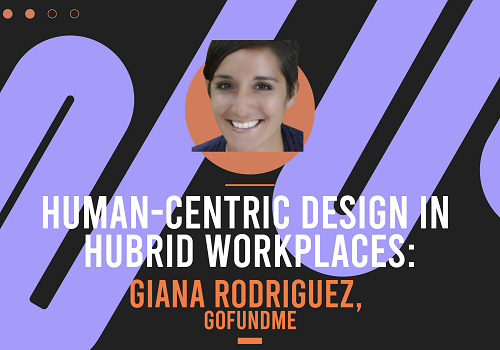
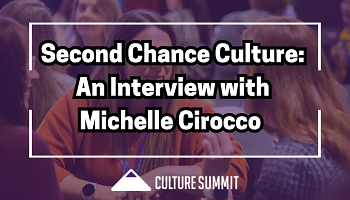
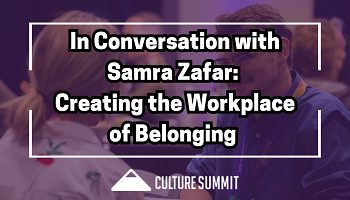
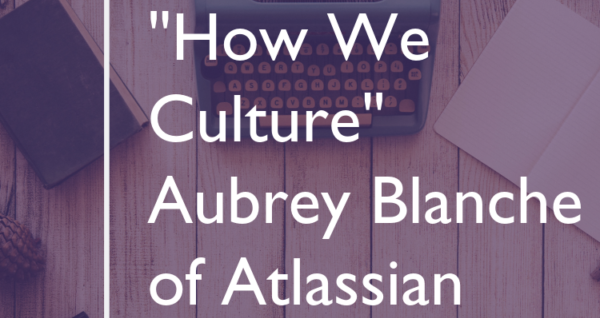
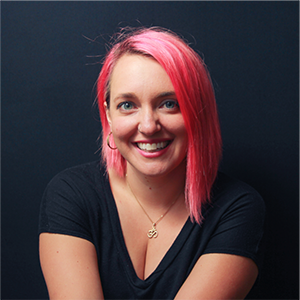
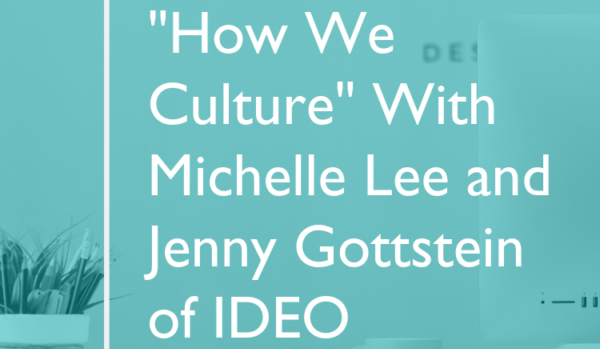






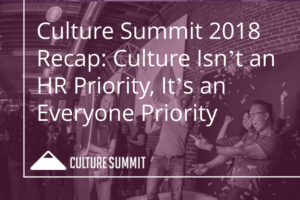






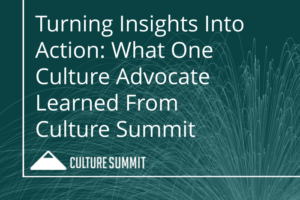
 Photo Credit: Cathryn Lynne Photo
Photo Credit: Cathryn Lynne Photo





